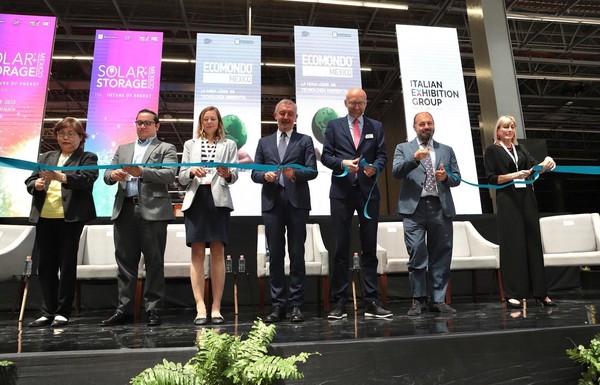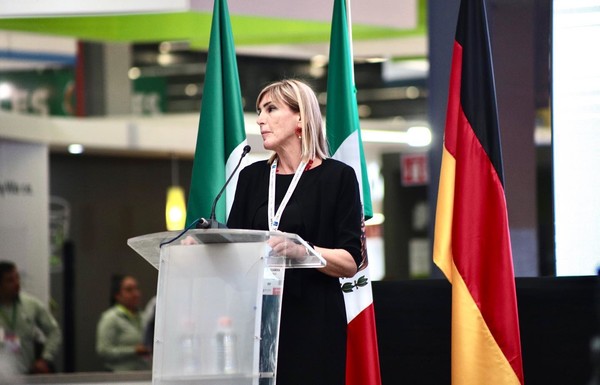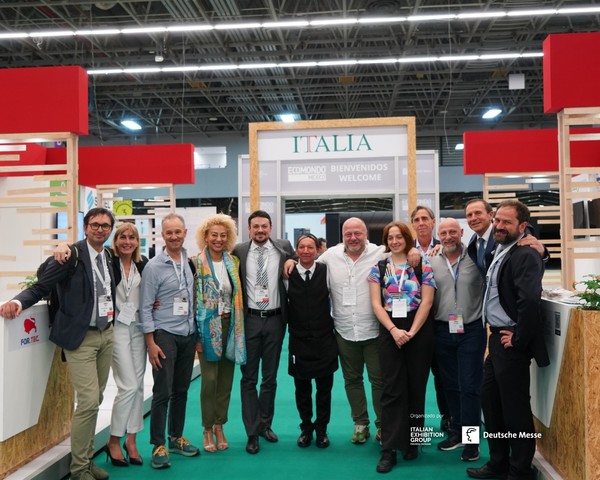ECOMONDO MEXICO AND THE CIRCULAR ECONOMY IN LATIN AMERICA
Bringing together technologies and solutions from sectors promoting the ecological transition and circular economy, but above all facilitating and accelerating business and networking opportunities with Latin American investors and potential national and international business partners.
These were the objectives of the second edition of Ecomondo Mexico, the result of a joint venture between Italian Exhibition Group and Hannover Fairs México. The Green Technology Expo took place on April 26th – 28th, 2023 at the Guadalajara fairgrounds, in the federal state of Jalisco. Once again, it was organized in conjunction with Solar+Storage, the first exhibition specialized in the energy and solar technology segment.

“Ecomondo Mexico 2023 saw the participation of about sixty companies. About 20 of them were Italian, but there were also Canadian, American and Mexican ones. Systematizing cooperation with local authorities and with the Italian-Mexican Chamber of Commerce was key to this success. The same is true for Agenzia ICE and the Ministry of Foreign Affairs, especially Ambassador Luigi De Chiara and his staff, who gave a decisive contribution,” comments Alessandra Astolfi, Global Exhibition Director Green & Technology Division at Italian Exhibition Group. “Besides the fair, there was a rich program of lectures and conferences illustrating the successful Italian and European models which we would like to export. I’m talking about organic waste collection, bioeconomy, packaging. The state of Jalisco, specifically the Guadalajara district, has a strong industrial vocation. In addition to being considered the Silicon Valley of Mexico, with all the needs related to the recovery of metals and of the contents of electrical and electronic components, it is also the world’s first tequila producer, with big companies interested in how to manage waste from the food supply chain.”

According to Francesco Fatone, professor at the Università Politecnica delle Marche and member of Ecomondo scientific committee, local authorities and companies are increasingly aware of how industrial activities impact the environment, and especially water resources, already affected by climate change. “This year’s Expo gave very positive results, with more companies attending, but also more contents and feedback than in 2022. We chose to focus on the issue of integrated water cycle management, in both urban and industrial sectors. The quality of water resources is a critical issue, because most of the water used for drinking comes from heavily contaminated surface water. So much so that people do not rely on these systems for drinking. We highlighted how risk analysis, which is rather poorly implemented, can play a crucial role in choosing the best sustainable strategies and technologies.”
The importance of the situation overseas, however, doesn’t lie only in the fact that Italy is Mexico’s third largest trading partner among EU countries – and the 12th globally. From rainforests to the biomes in the Andes mountains and to the waters of the Atlantic and Pacific Oceans, Latin America and the Caribbean are extremely rich in natural resources, which have always been exploited in order to support a linear economic model. As underlined by the Forum of Ministers of the Environment of Latin America and the Caribbean in February 2021, governments are now trying to turn this linear model into a circular one. The Covid-19 pandemic emphasized the fragility of an economy based primarily on natural resource extraction, which leads to land and soil degradation, generates waste and pollution, and deepens climate and biodiversity crises.
This is highlighted in the report Circular Economy in Latin America and the Caribbean: A Shared Vision. In 2018, 52% of Latin American and Caribbean countries depended from raw materials. The percentage rises to 100% if we consider South America only. This figure should not be surprising, given that commodity dependence in South America has always been high, with a continuous increase between 1970 and 2010. But the shift to a circular economy in the region has enormous potential, to the point that it has been valued around $4.5 billion by 2030. Moreover, the International Labor Organization (ILO) estimates that, alongside millions of new jobs generated by the energy transition, developing a circular economy will employ an additional 4.8 million people by the end of the decade.

However, investment is needed. “With the exception of Brazil and Mexico, most countries in Latin America underwent a major deindustrialization process during the 1980s. What we clearly see now is the opportunity to reinvest, to realize our economy through Industry 4.0 technologies,” explains Petar Ostojic, CEO of Neptuno Pumps and founder and executive director of Centro de Innovación y Economía Circular (CIEC). “It is a convergence of two big ideas. We cannot talk about circular economy without the fourth industrial revolution. They are two sides of the same coin. Almost every country in Latin America today has defined a roadmap towards circularity. The interesting thing is that the push in this direction often comes from the private sector.”
On this note, the Italian Exhibition Group is already looking ahead to the third edition of Ecomondo Mexico, to be held on April 17-19, 2024, at the Guadalajara Expo. “We are already working on the new edition, once more in Mexico and alongside Solar+Storage, the fair on renewable energies. We believe there is strong value in this combination, as companies involved in the energy sector are often also interested in topics such as recycling, waste valorization, water and circular economy.”
An article written by Emanuele Bompan

